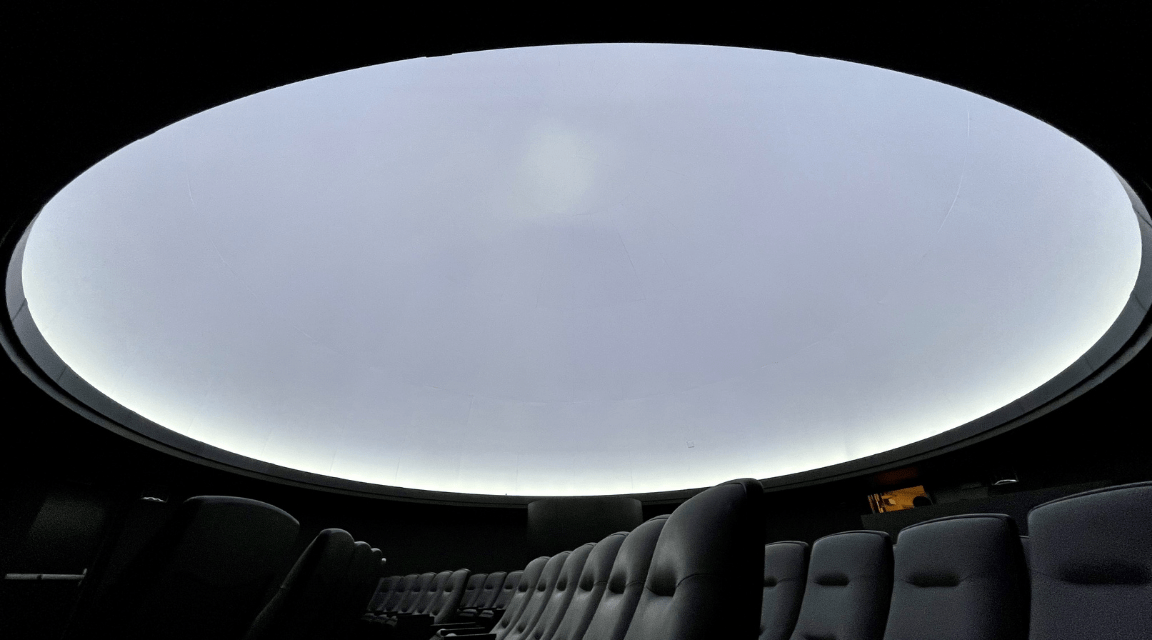Nimitz High School’s Robert Scott Pohl Planetarium reopened in December 2021, showcasing $250,000 in improvements undertaken by Irving ISD. When the planetarium first opened in 1968, it was one of the first public school planetariums in Texas. In 2009, the facility went completely digital, and six years later it was renamed for Pohl, a former teacher who ran the facility for 32 years.
The latest round of improvements, which took two years to complete due to the COVID-19 pandemic, includes new carpeting, seats, paint, surround sound system, and control console. The planetarium can now reach another level in capturing students’ imaginations as a valuable teaching tool for the district.
“The planetarium looks like we always dreamed it could at this point,” Chris Dazer, Irving ISD’s director of scientific discovery, said. “We’ve gotten a lot of validation from the kids and teachers. There are a lot of history and great relationships between our district and this facility. Some of our board members, a lot of our teachers and staff either attended Nimitz or came to the planetarium.”
Justice Williams, the planetarium’s director, teaches three classes each day to elementary and middle school students making field trips to the facility. Williams is relatively new to Irving ISD and feels privileged to teach at a planetarium inside a high school, something only 14 schools in Texas have.
“When I initially came here and was told about the planetarium, I was a bit mind blown, because where I went to school, we didn’t have a planetarium in our district,” Williams said. “You had to go to a museum to see one.”
Those running Irving ISD in the late 1960s deserve considerable credit for possessing the vision and foresight to build a planetarium at Nimitz, something practically unheard of in the Lone Star State.
“It’s reflective of the district’s unwavering commitment to bring science education alive and provide experiences to our students that elevate their learning,” Dazer said. “It has always been about enriching the experience in the classroom and outside of it.
“We’ve taken kids on field trips to LLELA [Lake Lewisville Environmental Learning Area] and to Cedar Ridge. Now we take them to our outdoor learning center. In the classroom, we provide all the hands-on science materials every teacher needs. At the net-zero school, we bring them to a facility that has sustainable energy with wind turbines, geothermal wells, solar panels, and water reclamation.”
Dazer has always viewed the planetarium as an integral part of everything the district does to give its students a well-rounded science curriculum. However, the recent improvements have made the facility even more impactful.
“Now, the planetarium rounds out the show,” Dazer said. “We’re hitting earth, sky, and everything in between. The planetarium experience feels like it should for 2022. It’s a highly vivid, graphic and surround sound experience.”
Williams likes educating students in such a unique setting.
“The planetarium offers a different perspective than usual classrooms,” Williams said. “The way typical classrooms work is there’s a lot of book work. Maybe you get to watch a movie, but almost everything is out of a book and on a two-dimensional plane.
“The planetarium offers an experience similar to going to a movie theatre and seeing a film, because it’s in a different field of vision with how it uses projection to bounce things off the dome. It provides a sense of wonder for a lot of kids they have not experienced. It’s a little bit more tactile, and they can engage with it a little bit more.”
As Dazer sees it, these latest improvements to the planetarium are only the beginning of how the district can expand how it utilizes this unique facility to impact more students.
“We want to see what else we can add to further enhance the experience,” Dazer said. “I don’t even know what that looks like. I don’t know if it’s virtual reality, if there’s more sensory things to it. The journey we’ve already undertaken is to make the experience inclusive to all students in the district.
“This facility is capable of getting those kids out here and experiencing things they haven’t done. We continue to try to expand our circle of influence and get as many people in here as possible.”






